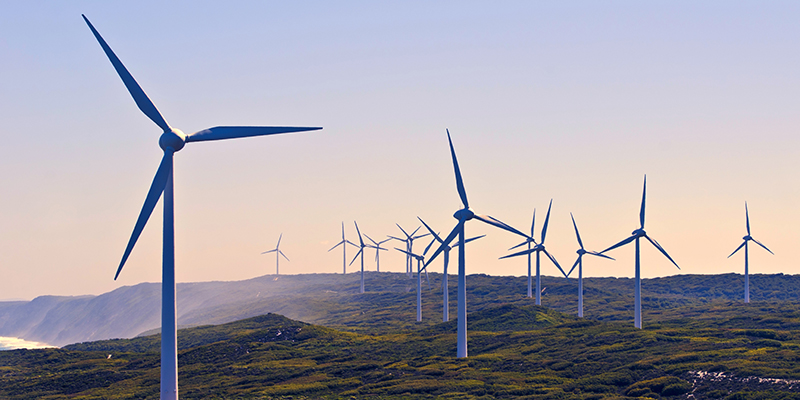However, access to renewables is still a challenge in many countries for operators as they decarbonise their networks
11th Nov 2022, London: As solutions-and-impact/connectivity-for-good/external-affairs/climate-action/ leaders solutions-and-impact/connectivity-for-good/public-policy/regulatory-environment/mobile-energy-efficiencyt at COP27 in Egypt, new figures from the GSMA have revealed that global mobile operators are making strong progress in maximising the use of renewable energy in their networks.
However, a survey indicates that access to an additional 64 terawatt-hours (TWh) of renewable electricity – roughly equivalent to Austria’s annual energy usage – will be required by operators globally by 2030, as they seek to decarbonise their energy supplies. These requirements were detailed in the recent GSMA Access to Renewable Energy Policy Paper.
The mobile industry was among the first to commit to achieving Net Zero by 2050, and since COP26, mobile operators have been scaling up the amount of renewable electricity used to power their networks to solutions-and-impact/connectivity-for-good/public-policy/regulatory-environment/mobile-energy-efficiencyt science-based targets.
The new analysis released by the GSMA today, using data from 33 operators, covering 86 countries and approximately 50% of global mobile connections, shows tangible results, with renewable electricity use increasing across the mobile sector:
- European networks are leading globally, purchasing on average 71% renewable energy.
- Mobile networks in 41 of the 86 countries surveyed use more than 75% renewable energy
- Mobile networks in 29 of the 86 countries use less than 25% renewable energy
- 32% of renewable used by operators is procured through power purchase agreements with energy generators
- 63% is achieved via renewable energy certificates from electricity markets
- 4% results from self-generation of renewable electricity
The figures show that operators in Europe and North America have been able to both access and scale up the amount of renewable electricity used to power their networks in recent years. In contrast, accessing renewable electricity is still a challenge in many countries, shown by lower market-based regional figures across Africa, the Middle East, Asia and South America.
John Giusti, Chief Regulatory Officer at the GSMA, said: “Operators are making meaningful progress in the use of renewables to power communications networks. However, given the scale of demand, the GSMA calls for greater collaboration between the private and public sector to expand the renewable energy infrastructure needed to hit our net zero ambitions. This will require reducing regulatory barriers, supporting market-based mechanisms to access renewable electricity and incentivising investment in new renewable power generation.”
Initiatives such as Vodafone’s recently-announced power purchasing agreement to buy renewable energy generated by three new solar farms in the UK, have shown that co-ordinated action with national policymakers and energy generators is possible to ensure that more renewable energy can be rapidly added to electricity grids over the next decade.
Joakim Reiter, Vodafone Chief External & Corporate Affairs Officer said: “After switching Vodafone’s European networks and operations to renewable energy, we are also making important strides in Africa. But accelerating the industry’s transition to renewables everywhere, in a more equitable way, will require significantly greater co-operation between the public and private sector. Governments increasingly embrace the enablement potential of telecoms itself to reduce carbon across society. This should go hand-in-hand with leveraging the telecom sector to attract long-term investments in renewable energy generation, increasing its availability and accessibility as part of national plans to enhance energy security and stimulate future-proof economic and social development.”
Based on research by the UN RaceToZero for COP26, the mobile industry should aim to decarbonise 70% of its electricity use by 2030[1].
Governments solutions-and-impact/connectivity-for-good/public-policy/regulatory-environment/mobile-energy-efficiencyting at COP-27 should grasp without delay the opportunity that renewable electricity provides to support the private sector achieving its net zero targets. More needs to be done to match the business demand for renewable and generate long term energy agreements, improving grid capacity and investor confidence.
[1] https://racetozero.unfccc.int/wp-content/uploads/2021/09/2030-breakthroughs-upgrading-our-systems-together.pdf
-ENDS-
About GSMA
The GSMA is a global organisation unifying the mobile ecosystem to discover, develop and deliver innovation foundational to positive business environments and societal change. Our vision is to unlock the full power of connectivity so that people, industry, and society thrive. Representing mobile operators and organisations across the mobile ecosystem and adjacent industries, the GSMA delivers for its members across three broad pillars: Connectivity for Good, Industry Services and Solutions, and Outreach. This activity includes advancing policy, tackling today’s biggest societal challenges, underpinning the technology and interoperability that make mobile work, and providing the world’s largest platform to convene the mobile ecosystem at the MWC and M360 series of events.
We invite you to find out more at gsma.com
For more information, see the GSMA Access to Renewable Energy Policy Paper
Media Contacts
GSMA Press Office
[email protected]


